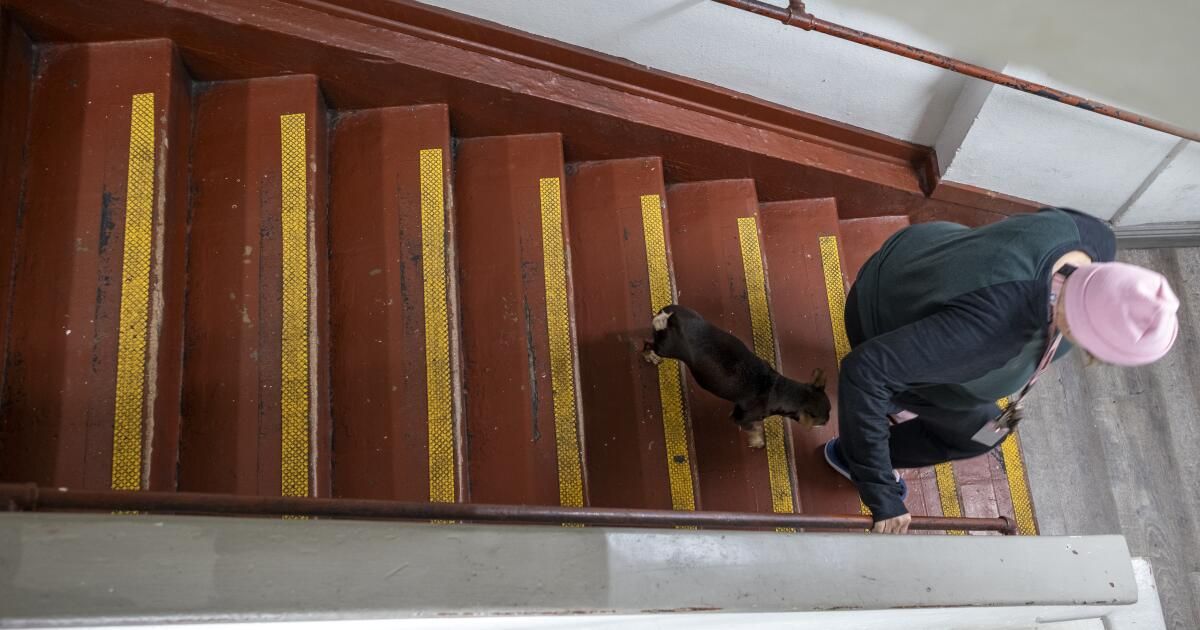The nonprofit AIDS Healthcare Foundation will pay current and former tenants of a Skid Row residential hotel $575,000 to settle a long-standing class-action lawsuit over the conditions of their property.
Residents of the Madison Hotel reported widespread problems including mold, vermin and plumbing and electrical issues that they say the foundation has not fixed.
The case was filed in Los Angeles County Superior Court in 2020, The settlement was reached Monday, when the trial was set to begin. A series of rulings by Judge William Highberger had limited the tenants' claims so that they could only seek rent reimbursement because of the conditions of the building's common areas. Most of the 200 residents of the century-old, one-bedroom hotel share bathrooms on each floor.
Jennifer Kramer, an attorney representing the tenants, said the settlement amount represents about 25 percent of the rent paid during the four-and-a-half-year period in question. Residents who lived at the Madison during that entire time would receive about $5,000 each, she said.
“We believe we reached a settlement that was as good as if we had gone to trial,” Kramer said.
The figure does not include attorneys' fees, which the plaintiffs' lawyers are still seeking.
The agreement requires Kramer to provide a statement on behalf of the tenants acknowledging that the foundation has invested significant resources in upgrading and modernizing the Madison as part of an effort to improve conditions on Skid Row.
The foundation paid $8 million for the property in 2017. Foundation officials say they have since paid $7 million in repairs and improvements to the Madison.
Foundation spokeswoman Jacki Schechner said the settlement “fully vindicates” the nonprofit, pointing to Kramer’s statement.
“The small payments made to 300 residents acknowledged that they experienced some hardship while the building was being upgraded,” Schechner said in a statement.
In addition to the financial settlement, the agreement requires the foundation to consult with experts and receive training on maintenance and management issues at the Madison. The foundation also agreed to hire a consultant to evaluate the building's elevator.
Last year, the foundation paid at least $832,000 to settle a separate lawsuit of elderly and disabled tenants who claimed they were trapped in their apartments or had to sleep in the lobby because of elevator failures. Since the settlement, the elevator has continued to malfunction.
In April, the foundation won a $1.5 million default judgment against the Madison's previous owner, who the nonprofit says failed to disclose the elevator's status.
Since buying the Madison, the nonprofit, which received $2.5 billion in revenue last year mostly from its pharmacy chain, has acquired more than a dozen underutilized low-income buildings in Los Angeles and worked to renovate them and lease rooms to tenants.
TO Last year's Times investigation found that many of the foundation's more than 1,300 residents are living in squalid conditions and that dozens are under threat of eviction.
The foundation still faces multiple lawsuits from its tenants over conditions at the Madison and elsewhere.
The foundation is involved in multiple initiatives in the November state elections. It is sponsoring Proposition 33that would expand rent control in California after two similar initiatives failed in 2018 and 2020. It is also being defended against Proposition 34which is funded by the California Apartment Association, the foundation's opponents in the fight for rent control. If passed, Proposition 34 would effectively ban the foundation from funding political and housing campaigns.












